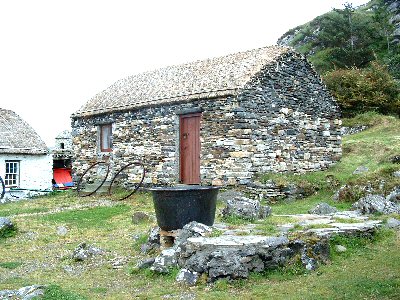Readers here will know of the respect I own for the late Ulster poet John Hewitt and also for the South Armagh folklorist Michael J Murphy.
The following poem was written by Hewitt in tribute to our ‘Last Druid’ Michael J Murphy.
It is entitled The Fairy Thresher.
That winter night round the blazing turf
The children on the hobs, the talk ran on,
Most from the farmer and his sister Kitty,
His wife not holding much with superstitions,
to rhyme and ramble through familiar stories
Of ghosts and fairies, witches, blinks and spells.
For instance, when a cub, the man himself
Joined with his brother to herd cattle in,
and a stirk turned and would not be compelled,
when it had strayed across the wee, stone bridge,
to follow the others, and a neighbour stood
to mock their efforts till they gave it up,
and he said, laughing, she’ll come back all right
when that wee man there goes away,
a wee man threatening by the door of the byre,
seen only by the neighbour and the stirk.
The sister told how once between the lights
In the next house up the road a woman answered
A tap on the half-door, and peering over, saw
A wee old woman standing in the street
Who begged her please to empty no more pots
Across the bru, for she’d come to lodge there
And all her family were nearly drowned.
The farmer launched into another tale
Of how a man, a famous storyteller,
To whom all happened, who was always present
When freets appeared, one midnight in Glenanne,
Carrying in his fist a smouldering turf
Which, blown to flame, would better any torch
To clear his homeward steps across the fields,
Heard a strange creature girning in the sheugh
And blew on his turf and by its light made out
A wee man with his face where his arse should be,
And charged towards him, thrusting the red turf
Into the scowling face, whereat the creature
Let out a yell and tore into the hedge,
Its speed a hare’s, its loud howl murderous.
This, told with vigour and economy,
Was new to me. I thought of Bosch and Breughel,
And wondered by what roads did the tale come here
Over Europe, out of the Dark Ages:
But thought it something out of character
With the old forts and thorns and fairy rings
And distant singing heard and fiddle music
And dancing light on hillsides, which I take
As proper to the ambience of the Glens
And the dim twilight of the tweedy poets.
The father faltered, as it seemed abashed
By his bold coarseness in that company
Of children and his womenfolk and us.
But suddenly the sister swept the talk
To charms and hedgerow cures dropped out of use,
For chin-cough and for cleaning of the blood,
That kept the people healthy years ago.
Thereat the brother at this hint began
A rambling story of a man he knew
Dead twenty years or more, lived birdalone,
Who had a charm for erysipelas, sprains –
With well-attested instances of each –
With nobody that he could pass it to.
He’d got it from an aunt, his mother’s sister,
And had been sworn to hand it to a niece,
For its transmission had to be from amle
To female and to male, alternately
By generation, a secret always held
Within that family only. But his niece
Was out in Boston. It could not be written.
He could not travel. She would not come back.
So ended what was known from Druid times.
His wife, the mother of the listening weans
Recalled a story that they loved to hear
A mother’s story, how a widow left,
Her corn unthreshed, her children infants, heard
A flail thump in the night, and peering out
To thank some kindly neighbour, saw a shadow
A little shadow, flit across the yard.
And in the light when she came out she found
The clean corn heaped in the middle of the floor.
And next night she heard the flail again
This time a fall of snow that smeared the ground
Exposed the track of feet from barn to gate;
The light impression showed the feet were small
And bare from heel to toe. So she went down
And bought a pair of shoes in the village shop
To match the little feet that she had measured
Smaller feet than any of her brood.
She set them out beside the flailing floor
And, waiting late, the third night heard a cry,
A cry of utter anguish and despair
Would break your heart to hear it, and she saw
The little shadow running from the barn,
Giving his grief these pitiable words,
‘She’s paid me off – she’s given me my wages,’
Repeated as he ran, and dying out
Into the darkness of the wall of hills.
We nodded, expectation satisfied:
The children chanted together, ‘She’s paid me off.
She’s paid me off. She’s given me my wages’ –
They’d only held their tongues till the mother finished:
This was a tale their children would remember,
And a boy or a girl might one day understand.
